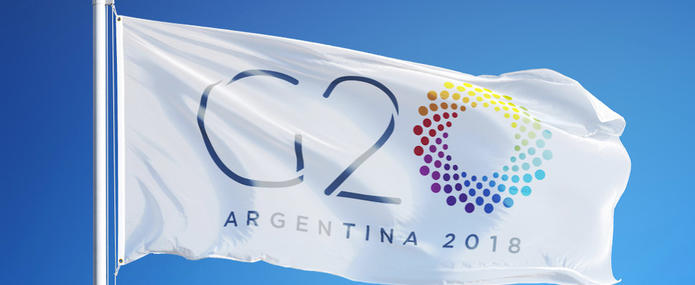As a key forum for international cooperation on global financial stability, the G20 is also seen as a place where coordination initiatives can be initiated and consolidated among the world’s major economies, before being presented and adopted in the UN’s multilateral framework. It is in this perspective that the T20, the G20 think tank network, is working to provide the G20 agenda with operational proposals grounded in research data.
However, such a vision of the G20 agenda is today facing opposition from unilateralist pronouncements from within, refuting the importance of common goods and of any need for multilateral coordination. What can the G20 do to make progress on the multilateral agenda, and what proposals were made at the T20 in Buenos Aires, which met on 17 and 18 September 2018?
Reforming global trade, the new mainstream?
At least two levels of T20 intervention can be distinguished. The first level is that of the T20 Summit’s final communiqué, i.e. its overall political direction. Intending to represent all participants since it is based on a summary of all contributions,[1] this document is necessarily consensual, which may seem paradoxical considering that the aim of think tanks is to produce new ideas from “outside the box”, and for whom a collective discourse is sometimes considered as pandering to the lowest common denominator. The T20’s communiqué, however, reveals much more than this, it provides a snapshot of the mainstream of government advisers’ thoughts, and of how these thoughts have changed.
In this regard, the centre of gravity seems to have shifted from unfailing support for a trade liberalization agenda, the negative impacts of which would require only marginal correctives, to the assertion of a need to reshape the multilateral trading system. For such a reform—which is nothing less than a regime change in the multilateral governance of trade—the T20 affirms the need to maintain key principles such as non-discrimination between countries, providing opportunities for access to national or regional markets, which are equal for all countries and regions, which has been the basis of trade negotiations since the post-war period, while taking the world’s multipolar nature more into account, along with the changes in power relationships in both economic and political terms. Practically speaking, the aim is to both open a dialogue on decision-making rules at the World Trade Organization (WTO) (for example on the vote by consensus) and to better link regional or multilateral and global agreements to preserve a system based on common rules and principles.
Furthermore, such a reform would also provide an opportunity to consider the effects of the digital revolution on trade practicalities, integrating both the opportunities that this would offer, as well as the risk that they would enable state-defined rules to be circumvented. Combined with the reaffirmation of the importance of the Paris Agreement, which G20 countries should implement in an exemplary and ambitious manner, and putting inequality onto the agenda, this T20 proposal would respond to the criticisms of many G20 population segments, while maintaining the multilateral framework as the priority, thus converging with the French President in the UN General Assembly forum, and the President of the European Commission in his State of the Union speech. However, can this proposal be supported by an Argentine presidency that is externally constrained by the predictable opposition of the President of the United States and weakened internally by the deterioration of the country’s economic situation? In this sense, the G20 risks being downgraded to the same status as the T20: simply a forum for ideas, perhaps even lacking the construction of a political consensus, although this can still be an important role.
An operational priority: the implementation of the 2030 Agenda for Sustainable Development by financial stakeholders
Regarding the second level of intervention: the T20 is also the place where, over several years, beyond the political inflections given by successive G20 presidencies, operational recommendations on more technical subjects are built, and for which the G20 can nevertheless appear to be a decisive place for political decision-making. Thus, beyond the assertion of the importance of the Paris Agreement and the 2030 Agenda for Sustainable Development, the T20 formulates practical proposals to enable development banks and the bodies responsible for financial stability to align their strategies with the achievement of the SDGs and Paris Agreement objectives, which could lead to the G20 becoming a real driving force for these institutions.
Read also
Aligning financial system architecture and innovation with sustainable development
Scaling Development Finance for Our Common Future
The T20 also suggests that G20 countries should be particularly active in reporting their efforts to implement the SDGs, which is a necessary condition to enable the High Level Political Forum on the 2030 Agenda, which will meet for his fourth session in summer 2019, to be able to accomplish a real progress report, supported by a policy evaluation capacity that has led to some successes, but also an objective analysis of failures and their causes. This is the perspective of IDDRI’s recommendations.
Japan’s upcoming 2019 G20 presidency should continue to focus on the implementation of ambitious climate policies, and could also place greater emphasis on the social dimension of the 2030 Agenda (education, health) within the development working group. The opportunity of the G7 French presidency next year should make it possible to link the social issues raised by Japan in the G20 with the issues of fragility and sustainability. IDDRI and the think tank networks in which it participates (IDGM, ETTG, T20) will seek to ensure the fluidity of the debate between these two forums, whose proposals at the operational level can have a determining role on key actors for the sustainability transition (ministries of finance, public and private actors in development finance), and assuming that the discussion deadlocks at the highest political level will not prevent a substantive debate on major issues, for example on the reform of the multilateral trading system.
[1] Even though it is not subject to participant validation.

